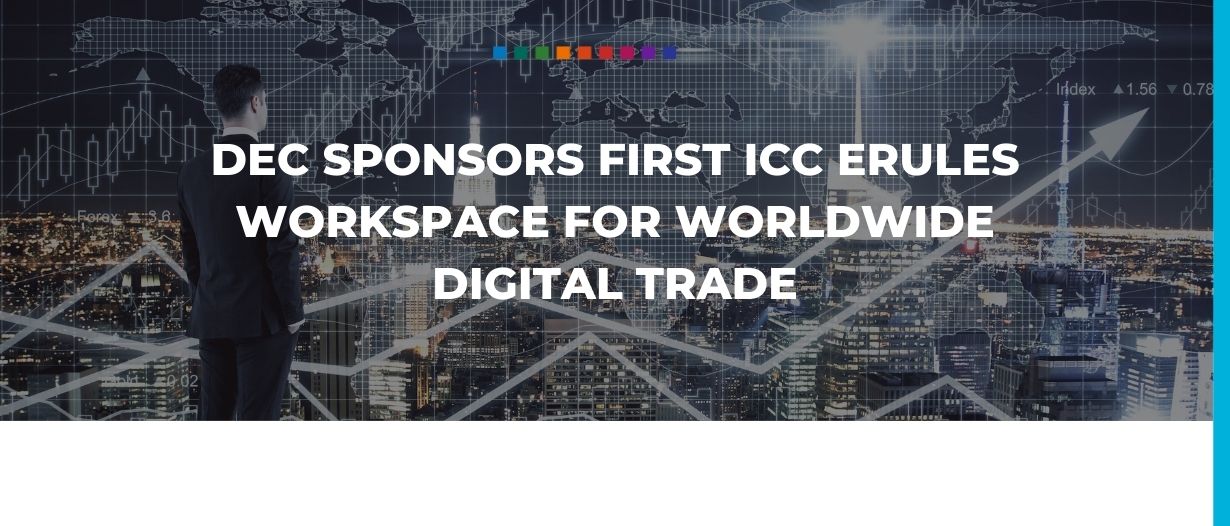This article was writen by John Dunlop and Simona Racek.
The San Diego and Imperial District Export Council (SDIDEC) has sponsored the first workspace for ICC eRules guidelines for digital trade transactions.
The eUCP Global Business Model Workspace is intended for use between MSME buyers and sellers worldwide, to increase their business by reducing the cost and complexity of trade; by going digital with interactive cloud shared trade transaction documents, procedures and video conferencing.
District Export Councils are organizations of business leaders from local communities, appointed by the U.S. Secretary of Commerce, whose knowledge of and expertise in international business provides a source of professional advice for their region’s local firms. Closely affiliated with the U.S. Commerce Department’s Export Assistance Centers and the U.S. and Foreign Commercial Service, over 60 DECs that exist throughout the country support the U.S. Government’s export promotion efforts.
eRules
- International Chamber of Commerce (ICC) eRules include the eUCP and eURC, published 1 July 2019.
- eUCP. Uniform Customs and Practice for Documentary Credits (UCP 600) Supplement for Electronic Presentation Version 2.0 (eUCP v2.0).
- eURC. Uniform Rules for Collections (URC 522) Supplement for Electronic Presentation Version 1.0 (eURC v1.0) 1 July 2019.
These eRules provide the guidelines for global trade to move from paper to digital documents. Purchase orders, packing lists, invoices, non-negotiable transport documents, certificates, letters of credit, documents against payment, etc., can now be presented for payment via the internet instead of paper being couriered around the planet – 4 billion paper documents are constantly in flow daily.
These two guidelines encompass both credit and collection trade finance payment methods, thus addressing 100% of global transactions, as all transactions are either a form of credit or collection. These guidelines address trade finance payments and not paper requirements for customs and/or local country laws.
eRules guidelines highlights
eUCP v2.0 and eURC v1.0 guidelines include:
- The eUCPv2.0 supplements ICC Publication UCP 600 in order to accommodate presentation of electronic records alone or in combination with paper documents.
- The eURC v1.0 supplements ICC Publication URC 522 in order to accommodate electronic records alone or in combination with paper documents.
- The eRules shall apply where the credit or collection indicates that it is subject to the eUCP or eURC.
- Document shall include an electronic record.
- Place for presentation means an electronic and/or physical address.
- Sign and the like shall include an electronic signature.
- Electronic records may be presented in any format (unless specified) by the credit.
- A presentation requires a Notice of Completeness listing the electronic records that are included in the presentation (new document).
- Any requirement for presentation of one or more originals or copies of an electronic record is satisfied by the presentation of one electronic record.

The eUCP Global Business Model Workspace
The eUCP GBM Workspace will increase trade between MSMEs by reducing the cost and complexity of trade transactions by:
- going digital with interactive cloud shared trade transaction documents
- using a standardized global business method; (and c) with buyer and seller video conferencing
The Global Business Model (GBM) is a standardized method for conducting business transactions between buyers and sellers worldwide, with or without commercial banks. Buyers and Sellers can use the eUCP GBM Workspace with Zoom conferencing to manage their trade transactions online with interactive Google GBM trade documents.
ICC eRules and the eUCP GBM Workspace
The eUCP GBM Workspace trade transaction documents conform to ICC Uniform Customs and Practice for Documentary Credits, UCP 600 and the Electronic Supplement 2.0 (eUCP); and ICC Uniform Rules for Collections, URC 522 and the Electronic Supplement 1.0 (eURC).
eUCP Global Business Model Workspace document templates include:
- BOA – Basic Ordering Agreement
- RFQ – Request for Quotation
- QTO – Quotation
- POR – Purchase Order
- POA – Purchase Order Acknowledgement
- PIV – Proforma Invoice
- TPI – Documentary Trade Payment Instructions
- APP – Documentary Trade Payment Application
- DTP – Documentary Trade Payment
- TCI – Documentary Trade Credit Instructions
- APC – Documentary Trade Credit Application
- DTC – Documentary Trade Credit
- AMD – DTC or DTP Amendment Application
- TDC – Documentary Trade Credit Transfer
- AOP – DTC Assignment of Proceeds
- SLI – Shipper’s Letter of Instruction
- PKL – Packing List
- INV – Invoice
- TBE – Trade Bill of Exchange
- INP – Inspection Certificate
- COO – Certificate of Origin / Beneficiary Certificate
- NOC – Notice of Completeness
- EXR – Examination Report
- ROF – Release of Funds
The document templates may be downloaded from the eUCP GBM Workspace and then uploaded into a cloud Google Drive for use by any importer, exporter, freight forwarder or bank. The GBM (Global Business Model) business method is part of the workspace application.
The created trade transaction documents (from the templates) can be viewed, edited, negotiated, and agreed to, simultaneously by the principles; face to face.

The GBM Workspace is available to everyone, everywhere
The San Diego and Imperial District Export Council (SDIDEC) sponsors the eUCP GBM Workspace, providing importers, exporters, freight forwarders, banks, and carriers, ICC eRules guidelines and compliant electronic trade documents. The eUCP GBM Workspace is available to everyone, everywhere.
Everyone involved with global trade owes thanks and respect to the farsighted vision of ICC’s Dan Taylor, Bernard S. Wheble, and James E. Byrne as pioneers in bringing us the first eUCPv1.0 in April 2002.
About Simona Racek

Simona Racek is the Director of Global Trade at Getting to Global, an innovative technology company that provides solutions and programs multiplying the impact of leading economic development, trade, and investment organizations around the world. Simona also serves as an International Expansion Advisor with the Los Angeles Regional Small Business Development Center Network and the California International Trade Center. Her expertise focuses on export solutions including assessing export regulations and facilitating applications for export-related financing and government grants. Simona is the President of Women In International Trade, Orange County Chapter.
 Australia
Australia Hong Kong
Hong Kong Japan
Japan Singapore
Singapore United Arab Emirates
United Arab Emirates United States
United States France
France Germany
Germany Ireland
Ireland Netherlands
Netherlands United Kingdom
United Kingdom










Comments are closed.